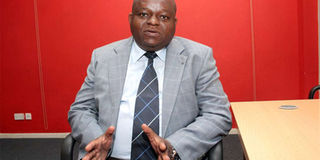You need to be connected to what you are studying

John Kioli, Chairman of Kenya Climate Change Working Group. PHOTO| DENNIS ONSONGO
What you need to know:
- Kenya is one of the most vulnerable countries in the world owing to the fact that we depend on weather-related resources for sustainability.
- The careers to consider are so many and varied because some are interlinked with the so called traditional careers.
- I encourage youth to register climate-change related CBOs, NGOs and faith-based organisations and apply for support from the Climate Change Fund, which can support them and help them to achieve climate change projects.
John Kioli is the chairman of Kenya Climate Change Working Group.
You studied Bachelor of Education but later went for a Master of Environmental Studies, Climate Change and Sustainability, which is quite a rare specialisation. What informed this shift?
I worked in the mining industry after I graduated with my first degree; the experience made me realise that one, I was passionate about climate-related issues and two, that I needed to have technical knowledge in climate change to grow and have more impact. Basically, passion is what drove me to climate change work. Kenya is one of the most vulnerable countries in the world owing to the fact that we depend on weather-related resources for sustainability. Our Tourism industry for example is nature based and any change of climate will affect the livelihoods of millions of Kenyans. In a nutshell, seeking alternatives in adaptation and mitigation on how to help our people brought me to the industry.
Your organisation, apart from climate change work, also works in the area of environmental advocacy. How do you bridge between the work of conservation and advocacy?
We have achieved this in a number of ways, for instance, we came up with the Climate Change Act that was signed by the president last year. This law has put measures in control of climate change problems in the country. I have also assisted some counties such as Kitui, Kajiado and Narok in coming up with climate change-related policies. At KCCWG, we believe that the best tool to ensure that we have long lasting change is by ensuring that laws and policy frameworks are in place; this moves us beyond the advocacy period.
For a young person who studied (or is studying) a climate-change related science or is in a related course, how would you advise them to prepare for the job market?
You need to be connected to what you are studying; you need to love what you study and most importantly, join networks or organisations dealing with climate change so that you get hands-on experience of what you are studying. Green Africa Foundation and Kenya Forest Working Group are examples of such organisations.
How do you draw young people to the organisation?
The Kenya Climate Change Working Group is a national CSO membership network and platform comprising civil society actors, faith-based institutions, communities, youth, non-governmental organisations, universities and research institutions striving to create synergies within the climate change arena through collaborative action.
KCCWG is organised into 10 thematic groups that reflect the major sectors of Kenya’s socio-economic development. These include forestry, gender and conflict over natural resources, energy, water, tourism, Road to conference of Parties among others. A young person with passion can easily find a place within the organisation.
Are there timelines when students and graduates can look out for internships and attachments in your organisation?
We always have interns from various universities and advertise these opportunities in our website and other channels such as social media. Regularly visit www.kccwg.org
Do you think that there is enough awareness about the importance of climate change at the grassroots?
To a greater extent yes. As an organisation we have held a series of awareness meetings across the country targeting the most affected counties. We have contributed to the various legislations at national and county government level that safeguard the mainstreaming of climate change issues in policy decisions.
Would you say that environmental conservation is an area that is open to young people?
Climate change is one of the biggest threats faced by our natural world and also a tough social and economic issue. This is something that we cannot leave for future generations to clean up; we must join hands now and embed climate issues in all our efforts
What are some of the careers that young people taking environmental-related courses can consider?
The careers to consider are so many and varied because some are interlinked with the so called traditional careers, however, to mention a few, we have environmental lawyers, research fellows, climatologists, oceanographers, climate change experts and analysts.
What was your first job? What are some of your most memorable experiences of it?
I worked in a mining company as a junior officer. The employees in that company came from different countries, and that gave me exposure especially regarding working with people from different cultures. I was later promoted from a junior officer to the level of a General Manager in Rockland Kenya Limited; this move gave me the push to work harder and grow to the level that I am at today.
You were recently appointed by President Uhuru Kenyatta to be a member of the Climate Change Council under the Climate Change ACT 2016, how do you intend to use this position to the benefit of the youth?
I encourage youth to register climate-change related CBOs, NGOs and faith-based organisations and apply for support from the Climate Change Fund, which can support them and help them to achieve climate change projects.
What is your most memorable experience at university that is non-academic?
When I was doing my second degree with younger students in my initial classes, they thought I was the lecturer, only to find out later that I was a fellow student!





